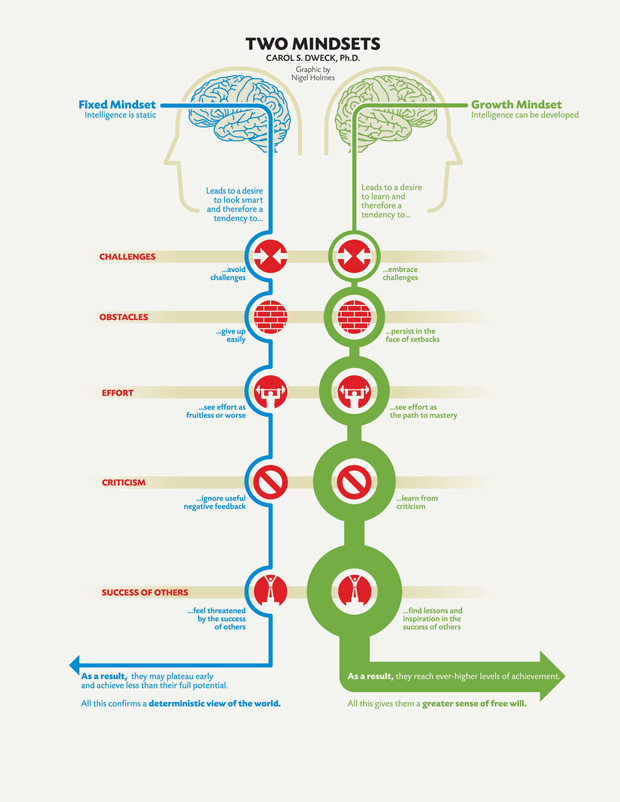Carol Dweck: A Summary of Growth and Fixed Mindsets

Metadata
- Author: Farnam Street
- Full Title: Carol Dweck: A Summary of Growth and Fixed Mindsets
- URL: https://fs.blog/carol-dweck-mindset/
Highlights
- Mindset: The New Psychology of Success. The book takes us on a journey into how our conscious and unconscious thoughts affect us and how something as simple as wording can have a powerful impact on our ability to improve. (View Highlight)
- Dweck’s work shows the power of our most basic beliefs. Whether conscious or subconscious, they strongly “affect what we want and whether we succeed in getting it.” Much of what we think we understand of our personality comes from our “mindset.” This both propels us and prevents us from fulfilling our potential. (View Highlight)
- What are the consequences of thinking that your intelligence or personality is something you can develop, as opposed to something that is a fixed, deep-seated trait? (View Highlight)
 (View Highlight)
(View Highlight)- Your view of yourself can determine everything. If you believe that your qualities are unchangeable — the fixed mindset — you will want to prove yourself correct over and over rather than learning from your mistakes. (View Highlight)
- There’s another mindset in which these traits are not simply a hand you’re dealt and have to live with, always trying to convince yourself and others that you have a royal flush when you’re secretly worried it’s a pair of tens. In this mindset, the hand you’re dealt is just the starting point for development. This growth mindset is based on the belief that your basic qualities are things you can cultivate through your efforts. (View Highlight)
- as you begin to understand the fixed and growth mindsets, you will see exactly how one thing leads to another— how a belief that your qualities are carved in stone leads to a host of thoughts and actions, and how a belief that your qualities can be cultivated leads to a host of different thoughts and actions, taking you down an entirely different road. (View Highlight)
- in the growth mindset, failure can be a painful experience. But it doesn’t define you. It’s a problem to be faced, dealt with, and learned from. (View Highlight)
- The Power of … Yet (View Highlight)
- Are you not smart enough to solve it …. or have you just not solved it yet.” (View Highlight)
- I heard about a high school in Chicago where students had to pass a certain number of courses to graduate, and if they didn’t pass a course, they got the grade “Not Yet.” And I thought that was fantastic, because if you get a failing grade, you think, I’m nothing, I’m nowhere. But if you get the grade “Not Yet” you understand that you’re on a learning curve. It gives you a path into the future. “Not Yet” also gave me insight into a critical event early in my career, a real turning point. I wanted to see how children coped with challenge and difficulty, so I gave 10-year-olds problems that were slightly too hard for them. Some of them reacted in a shockingly positive way. They said things like, “I love a challenge,” or, “You know, I was hoping this would be informative.” They understood that their abilities could be developed. They had what I call a growth mindset. But other students felt it was tragic, catastrophic. From their more fixed mindset perspective, their intelligence had been up for judgment and they failed. Instead of luxuriating in the power of yet, they were gripped in the tyranny of now. (View Highlight)
- Don’t praise intelligence or talent, praise the work ethic.
… [W]e can praise wisely, not praising intelligence or talent. That has failed. Don’t do that anymore. But praising the process that kids engage in: their effort, their strategies, their focus, their perseverance, their improvement. This process praise creates kids who are hardy and resilient. (View Highlight)
- In one study, we taught them that every time they push out of their comfort zone to learn something new and difficult, the neurons in their brain can form new, stronger connections, and over time they can get smarter. … students who were not taught this growth mindset continued to show declining grades over this difficult school transition, but those who were taught this lesson showed a sharp rebound in their grades. We have shown this now, this kind of improvement, with thousands and thousands of kids, especially struggling students. (View Highlight)